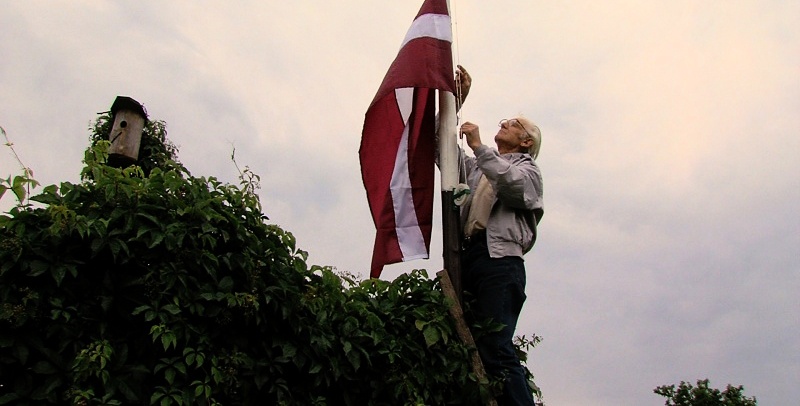Jānis Kažociņš, security adviser to Latvia’s foreign and defence ministers and a former director of the Constitution Protection Bureau (SAB, Latvia’s intelligence and security service), recently published probably the best and most realistic analysis of possible threats from Russia towards Latvia, and how to deal with them: Will Latvia Be Putin's Next Victim in 2015 in the Latvian Foreign and Security Policy Yearbook 2015.
The essay is worth studying in detail, but one particular passage caught my eye:
‘…the potential costs of a Russian military adventure in the Baltics must be increased to the point where it becomes both politically and militarily unattractive. This means that low level self-defense must be capable of inflicting substantial casualties on an aggressor and preventing a quick and painless occupation. Of course the Latvian National Armed Forces are unable to secure the whole of her territory against a regional super-power alone. However, appropriate doctrine and the smart use of small units in an asymmetric way can raise costs substantially and buy time for allied reinforcement.’ (p. 78)
This is fine as far as it goes, but in effect is only circling the wagons (in an asymmetric way) and waiting for the NATO cavalry to arrive from Norway and Germany. Whether or not the cavalry come, smart use of small units of the Latvian Army is not enough; resistance to invasion and occupation must ultimately embrace the whole population.
But civilian resistance movements are always anathema to governments and generals, fearing revolution after the war is won. Of course I am not privy to Latvia’s secret defense plans and there may well be a “Plan B” under wraps, involving arming and training the civilian population in guerrilla warfare, though somehow I doubt it.
Yet this is precisely what should be done. And in Latvia there are precedents.
The revolution of 1905 in the “Baltic provinces of Russia” was the most important event in the history of modern Latvia; the first (and arguably, the only) time that Latvians came together as a united nation to resist Russian imperialism by force of arms.
In the countryside bands of Forest Brothers (Mežabrāļi) carried out partisan attacks on Russian military detachments; while in the cities groups of urban fighters (kaujinieki) waged war on Russian soldiers, collaborators and policemen. In a two-year period ending on 30 January 1906, the municipal police in Riga lost 110 officers to armed attacks (in most cases their weapons were stolen), more than a quarter of the entire police force.
Predictably, the Russian authorities denounced such attacks as “terrorism”. Out of this experience, came a distinct Latvian anarchist movement, which became the principal element in the resistance to Russian state terrorism in the Baltic, until the outbreak of world war in 1914.
The idea of the “mežabrāļi”, resisting from the forest, never died; each time Latvia’s Republic was invaded bands of partisans, a high proportion of them civilian, took up arms against occupation (most heroically from 1944 to 1958), in order to make it ‘both politically and militarily unattractive’.
Of course civilian armed resistance is incapable of winning wars unaided. It is only ever a rear-guard, not the vanguard as Che Guevara believed, of any struggle. But a foreign occupying army In Latvia has one inherent weakness – it must occupy territory.
The essence of “the war of the flea” is that the guerrilla sacrifices territory to gain time, and uses time to increase will – the will of the people to resist, and a space for a political and/or military solution to be found. As long as armed resistance continues it has the advantage.
As the IRA warned the British Government in 1984 after their attempt on Margaret Thatcher in Brighton: ‘Today we were unlucky, but remember we only have to be lucky once. You will have to be lucky always. Give Ireland peace and there will be no more war’.
The leader of the IRA then, Martin McGuinness, is today Deputy First Minister in the government of Northern Ireland; yesterday’s “terrorist” no longer.
And for those who may object that I am advocating “terrorism”, stop for a moment and consider this: the democratic nations of Eire, Israel, South Africa and the USA (to name but a few) all owe their existence, in some degree, to the widespread use of political violence waged (in the eyes of the law) by civilians, against an occupying colonial power.
So whatever criticisms may be leveled against the idea of armed resistance, nobody can say that it doesn’t deliver the goods.
In the context of the current war in Ukraine and an increasingly vocal resurgence of Russian imperial ambition aimed at the Baltic states, Latvia’s historical experience of resistance offers useful lessons for anyone open-minded enough to dispense with tabloid-newspaper attitudes to civilian resistance; and for adopting the practical measures needed to prepare to meet a worst-case scenario of Russian imported hybrid warfare, invasion, or occupation before the need arises.
(Philip Ruff will be speaking on "Anarchist resistance to Russian state terrorism in the Baltic (1905-14) and its relevance to countering Russian imperial ambition today" at the Stockholm School of Economics in Riga on Thursday 26 February, at 17:00-18:30. You can register for the event HERE)































